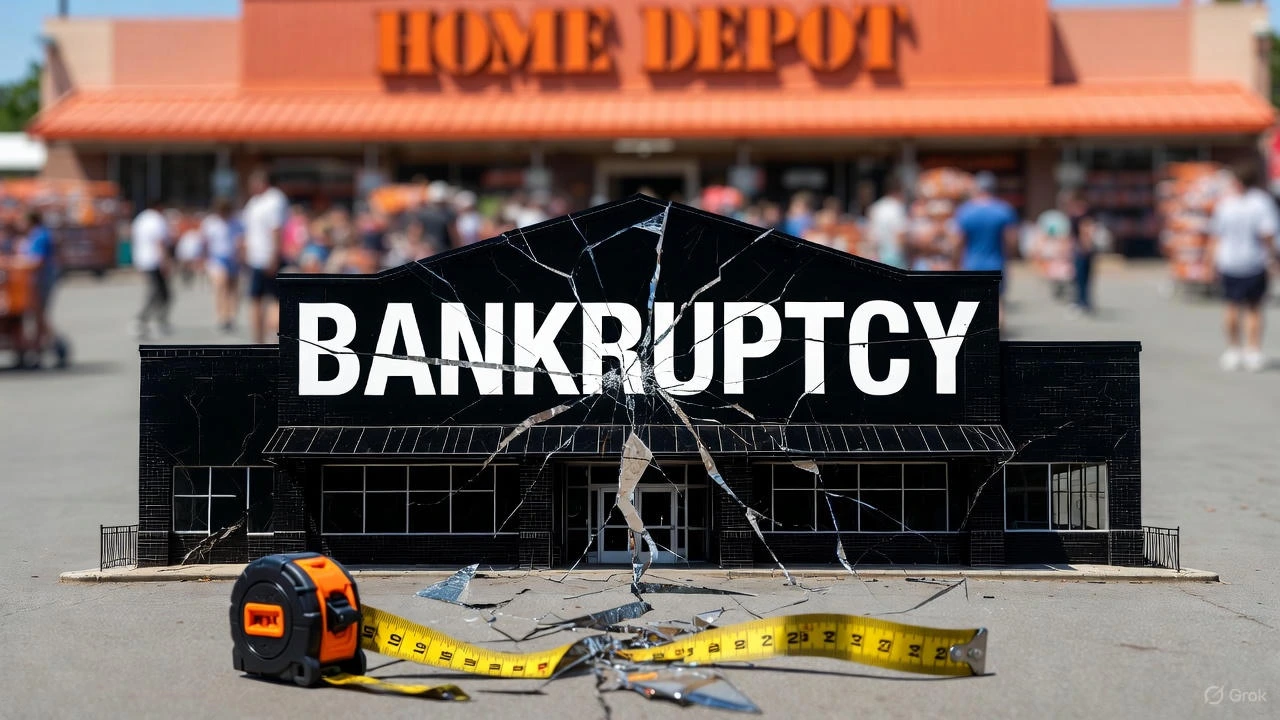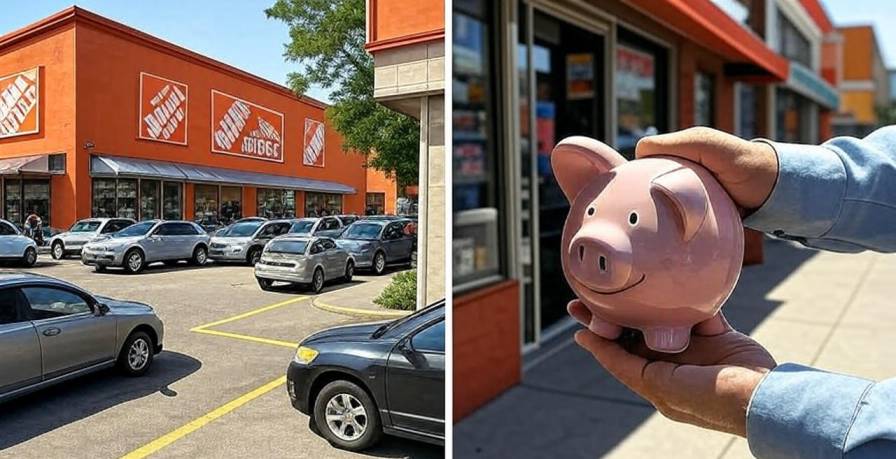
So, one of Home Depot’s top competitors just filed for bankruptcy. Yeah, you heard that right.
But wait — it may not be the mega-store you’re imagining, and that’s what actually makes all of this a much bigger deal. We are not only dealing with the closing of another store. This is about the behind-the-scenes drama and the quiet struggles of companies that keep the entire home improvement world running.
When you see a headline like home depot rival files for bankruptcy, your first thought is probably about a huge competitor like Lowe's. But the truth is, the home improvement market is a complicated place, and the pressure is squeezing everyone, from the big-name flooring chains to the major wholesale suppliers for your friendly neighborhood hardware store.
Recently, two major players in the broader Home Depot competitor landscape hit hard times. LL Flooring, which specializes in hardwood, and True Value Co., the massive hardware product wholesaler for thousands of independent retailers, both had to take drastic measures to stay afloat.
It’s actually a bigger deal than you might suspect — and here’s why.
Recommended to read: Roth IRA Lump Sum Strategy: How to Invest a Large Amount Now
What It Means When a Big Company Can’t Pay Its Debts?

Let’s start with the basics. What does it even mean for a big company, whether an archrival of Home Depot’s or one of its suppliers, to file for bankruptcy?
Think of a corporation as a family with an allowance. If the coming-in money (sales) is less than the going-out money (bills such as rent, payroll and repayment of loans), you’re in trouble.
For a business, that trouble is called bankruptcy. But it's not always an "End Game" sign.
The Magic of Chapter 11
When a company files for bankruptcy, they usually go for what’s called Chapter 11. This isn't like Chapter 7, which is basically throwing in the towel and liquidating everything.
-
Chapter 11 is a time-out. The company goes into court and says, "We owe all this money, but we think there's a way to fix it if you give us some breathing room."
-
The Goal is to Reorganize. They receive court protection from their creditors (the people to whom they owe money), enabling them to restructure the business, close unprofitable stores and come up with a new plan for paying back what they owe over time. It’s a second chance to become a healthy, successful company again.
Advertisement -
A "Rival" Can Reorganize. When a home depot rival files for bankruptcy chapter 11, it's usually a signal that they are slimming down and restructuring to be more competitive in the long run.
Seriously, the first time I read about this, I had to re-read it several times and was scratching my head over the whole Chapter 11 business. The best comparison is something like a messy kid’s bedroom. Chapter 11 is when Mom (the court) slams the door for a week and tells the kid (the company) that he’s got to clean up his act before he can come out and play again. They get a chance to save their favorite toys!
The Two Faces of The Home Depot Rival Struggle

The recent bankruptcies in the home improvement world highlight two different ways companies compete with a giant like Home Depot.
1. The Supplier Hub: True Value Co.
True Value Co. isn’t a store you walk into directly, but it's a huge wholesaler. Think of them as the home depot supplier hub for thousands of independently owned hardware stores across the country. These are the small, local shops that have been around for decades.
-
What Happened: In a recent filing (specifically in late 2024), True Value Co., which supplies products to about 4,500 independent retailers, filed for Chapter 11 protection.
-
The "Why": The group's leaders determined that the best way forward would not be to go it alone, but rather to sell off its assets to another, larger co-op — Do It Best Corp. This was strategy — an orderly sale designed to keep the supply chain humming for all those thousands of tiny stores.
-
The Impact: This move helped prevent a catastrophic supply chain failure. Instead of all those small stores losing their product source, the business was acquired by a new owner, keeping those independent hardware stores in business and ensuring they can continue to compete with the big box stores.
2. The Specialist Retailer: LL Flooring
LL Flooring, formerly called Lumber Liquidators, is a specialty retailer. They take on Home Depot and Lowe’s by specializing in one thing: flooring.
-
What Happened: LL Flooring also recently filed for Chapter 11.
-
The "Why": The company struggled for a few reasons. For one thing, materials — lumber in particular — grew wildly expensive during and after the pandemic. Second, fewer people were buying homes and doing huge renovations at a time when most people did buy new floors. This one-two punch of more money and less demand made an impossible situation even worse.
-
The Impact: After failing to find a viable buyer to keep the company going, they were ultimately forced to liquidate and close all their remaining stores. This is the more dramatic and noticeable outcome of a home depot rival files for bankruptcy chapter 11—the stores shut down.
Read Also: Best Savings Accounts Nov 2025 – Up to 5% Rate
Why Does This Affect You and Me? The Ripple Effect
The bankruptcy of a home depot rival files for bankruptcy is never just a business story. It sends ripples out to everyone.
If You're a Homeowner or DIY-er:
-
Fewer Choices, Higher Prices: The fewer boutiques out there, the less competition there is for the remaining giants like Home Depot and Lowe’s. When there is less competition, these companies don’t have to worry about offering super low prices.
-
Loss of Specialization: Smaller, specialized stores or specialty chains (such as LL Flooring) often have unique, high-quality, hard-to-find products. When they close, you lose that option and might have to settle for the limited selection at a huge box store.
The Economy in General:
-
Job Losses: When a company goes bust, thousands of people lose their jobs — not just the cashiers and floor workers but also the workers in warehouses, corporate offices and the supply chain. This is a brutal blow to local economies.
-
The "Amazon Effect": A lot of these bankruptcies are happening because of the sheer scale of companies like Amazon, which is increasingly selling tools, hardware, and home improvement goods online. The giant stores are also using new technologies to cut costs and squeeze out the competition, leading to a rise in home depot bankruptcy filing rumors about smaller chains.
The Four Main Reasons These Rivals Are Struggling
In the world of business, nothing happens for just one reason. It's usually a perfect storm. Here are the four core reasons that have sent these Home Depot rivals over a cliff:
-
Too Much Debt: A lot of companies borrowed big in good times, believing that their growth could last into eternity. When business began to dry up, they could no longer keep making the payments.
-
The Post-Pandemic Slump: Amid lockdowns, everyone was at home repairing things. The demand for lumber, tools and paint was crazy! But when the world opened back up again, that frenzy stopped, and retailers were left with lots of pricier inventory and little demand.
-
Inflation and High Costs: he price of everything — gas for shipping, wood from the mill, even electricity for the stores — soared. Firms couldn’t hike prices quickly without driving away customers, so their profit margins were completely wiped out.
-
The Home Depot/Lowe’s Juggernaut: In short, these are two really good companies at doing what they do. They buy products in such huge volumes that they get better prices than anyone else. They also have huge marketing budgets and often even offer their own "private label" brands. This constant pressure is the most common reason for a home depot rival files for bankruptcy story.
What's Next? The Long-Term View
While the headlines sound scary, Chapter 11 isn't always a sad ending.
The situation with the home depot supplier hub True Value is a prime example of a successful reorganization. By selling to Do It Best, they ensured that thousands of small businesses will continue to receive the products they need to survive. It's a clean handover that keeps competition alive.
For retailers like LL Flooring, it’s a warning sign. It’s the proof that you can’t just be specialized in one area anymore. You have to be perfect on your inventory and customer service and prices if you’re going to survive against the Goliaths.
You should read this piece and feel that much more grateful for local businesses. They are fighting a hard war against very strong forces.
The next time you read about a company declaring bankruptcy, you’ll understand exactly what that means and why it matters. It’s not just a dry financial story; it’s an epic story about competition, survival and the future of where we buy the tools to build our lives.
Your Quick Q&A: Making Sense of the News
Q: What does it mean when a Home Depot competitor files for bankruptcy?
A: When a competitor of home depot declares bankruptcy, it indicates that the company is having financial difficulties and needs assistance in paying off its debts. They typically file for Chapter 11 protection in order to reorganize and attempt at a turnaround, rather than close down altogether. It’s like having a reset button on their business plan.
Q: Why do we keep hearing about home depot closing?
A: That’s a common mix-up! Home Depot itself is actually doing great and isn't closing. The confusion happens because other, smaller companies are struggling or closing, and they are often referred to as "Home Depot rivals." Easy to make when you see a headline about a home depot bankruptcy filing (like it is always a competitor or supplier).
Q: What is the difference between Chapter 7 and Chapter 11 bankruptcies?
A: It's simple. Chapter 7 is when a business gives up. They close down, sell everything they own, and use that money to pay back as much debt as possible. Chapter 11 is the fighter’s choice—they don't close, but instead get a plan approved by the court to run the business while paying back debts.
Q: Is the home depot supplier hub going to run out of products?
A: Not in this case! True Value Co., the biggest hardware supplier to file for Chapter 11, sought to sell its assets to another company, Do It Best Corp. This was a smart decision to keep the supply chain moving. The new owner came in, and they made damn sure that all those thousands of tiny hardware stores continue to get the things they need so we’re not out of stock.










